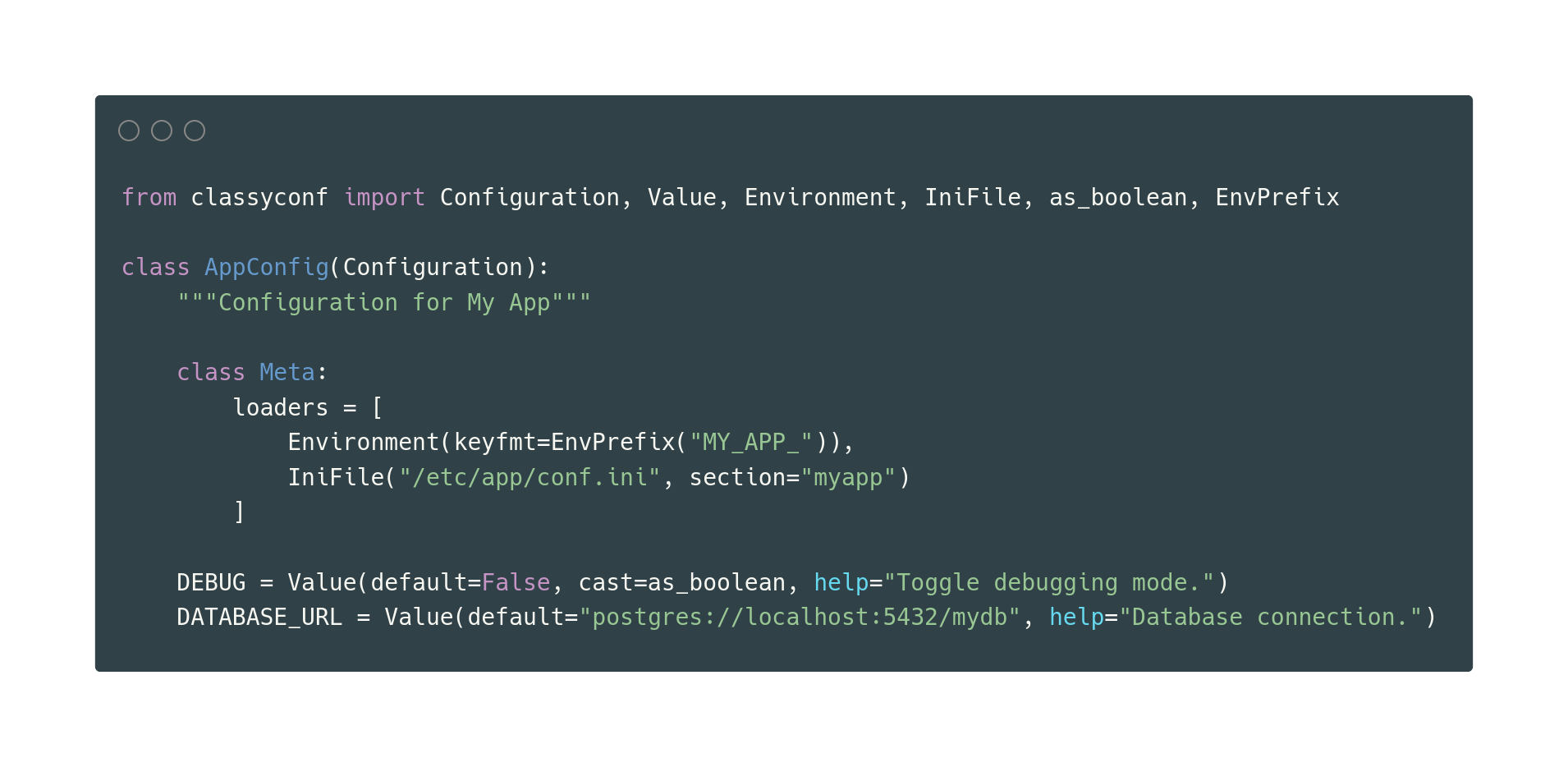https://github.com/hernantz/classyconf
Declarative and extensible library for configuration & code separation
https://github.com/hernantz/classyconf
configuration python3 settings-management twelve-factor
Last synced: 6 months ago
JSON representation
Declarative and extensible library for configuration & code separation
- Host: GitHub
- URL: https://github.com/hernantz/classyconf
- Owner: hernantz
- License: mit
- Created: 2020-05-17T00:21:22.000Z (over 5 years ago)
- Default Branch: master
- Last Pushed: 2023-02-08T01:30:15.000Z (over 2 years ago)
- Last Synced: 2024-09-16T00:25:58.271Z (about 1 year ago)
- Topics: configuration, python3, settings-management, twelve-factor
- Language: Python
- Homepage: https://classyconf.readthedocs.io/en/latest/
- Size: 212 KB
- Stars: 83
- Watchers: 2
- Forks: 4
- Open Issues: 5
-
Metadata Files:
- Readme: README.md
- Contributing: CONTRIBUTING.md
- Funding: .github/FUNDING.yml
- License: LICENSE.txt
Awesome Lists containing this project
README
# ClassyConf


[](https://codecov.io/gh/hernantz/classyconf)

**ClassyConf is the configuration architecture solution for perfectionists with deadlines.**
It provides a declarative way to define settings for your projects contained
in a class that can be extended, overriden at runtime, config objects can be
passed around modules and settings are lazily loaded, plus some other
goodies.
You can find out more documentation at [Read the
Docs](https://classyconf.readthedocs.io/en/latest/index.html) website, and
the [intro post](http://hernantz.github.io/configuration-is-an-api-not-an-sdk.html) here to understand the motivations behind it.
Here is a preview of how to use it:
```python
from classyconf import Configuration, Value, Environment, IniFile, as_boolean, EnvPrefix
class AppConfig(Configuration):
"""Configuration for My App"""
class Meta:
loaders = [
Environment(keyfmt=EnvPrefix("MY_APP_")),
IniFile("/etc/app/conf.ini", section="myapp")
]
DEBUG = Value(default=False, cast=as_boolean, help="Toggle debugging mode.")
DATABASE_URL = Value(default="postgres://localhost:5432/mydb", help="Database connection.")
```
Later this object can be used to print settings
```python
>>> config = AppConfig()
>>> print(config)
DEBUG=True - Toggle debugging mode.
DATABASE_URL='postgres://localhost:5432/mydb' - Database connection.
```
or with `__repr__()`
```python
>>> config = AppConfig()
>>> config
AppConf(loaders=[Environment(keyfmt=EnvPrefix("MY_APP_"), EnvFile("main.env")])
```
extended
```python
class TestConfig(AppConfig):
class Meta:
loaders = [IniFile("test_settings.ini"), EnvFile("main.env")]
```
overridden at runtime
```python
>>> dev_config = AppConfig(loaders=[IniFile("dev_settings.ini")])
>>> dev_config.DEBUG
True
```
accessed as dict or object
```python
>>> config.DEBUG
False
>>> config["DEBUG"]
False
```
iterated
```python
>>> for setting in config:
... print(setting)
...
('DEBUG', Value(key="DEBUG", help="Toggle debugging on/off."))
('DATABASE_URL', Value(key="DATABASE_URL", help="Database connection."))
```
or passed around
```python
def do_something(cfg):
if cfg.DEBUG: # this is evaluated lazily
return
```